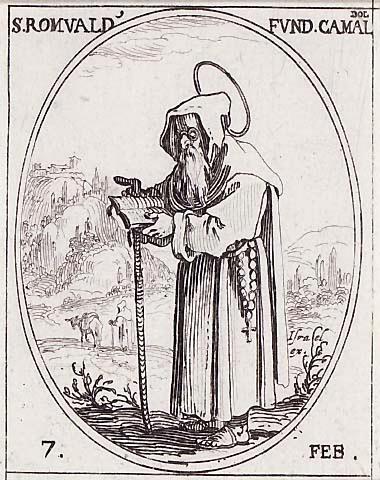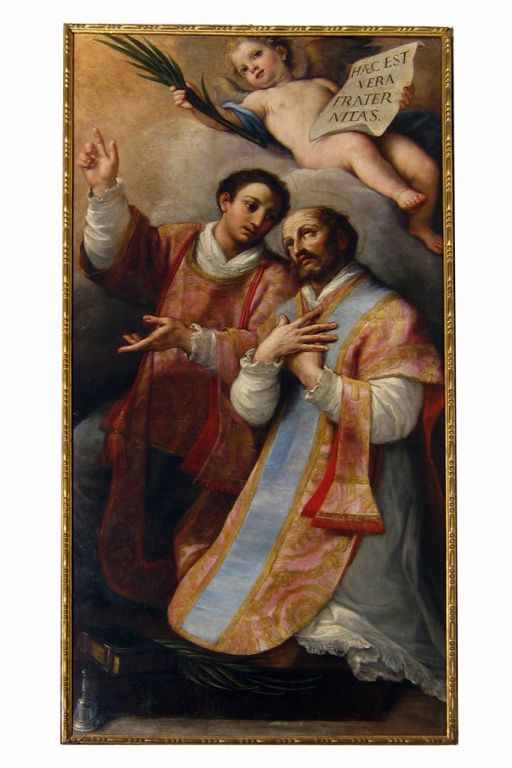Saint Romuald, Abbot, February 7
A homily by St. Jerome the Priest
Peter doth speak with a mighty self-confidence! He was but a fisherman ; he was not rich ; he earned his bread only as a skilled labourer ; yet was he bold enough to say : We have forsaken all. And because to forsake things, and to do nothing more, is not enough, he addeth that which maketh all forsaking to be perfect : And we have followed thee. We have done what thou commandest ; how wilt thou reward us? And Jesus said unto them : Verily I say unto you, that ye which have followed me, in the regeneration when the Son of Man shall sit in the throne of his glory, ye also shall sit upon twelve thrones, judging the twelve tribes of Israel. Jesus saith not : Ye which have forsaken all,(for even Crates the Philosopher did this, and many others also have despised riches,) but : Ye which have followed me : which words apply only to the Apostles and the rest of the faithful.
In the regeneration (saith the Lord) when the Son of Man shall sit on the throne of his glory, and when from corruption the dead shall be raised in incorruption, ye also shall sit upon twelve thrones of judgement, judging the twelve tribes of Israel. And why? Because ye believed in me, whereas they would not. And every one that hath forsaken houses, or brethren, or sisters, or father, or mother, or wife, or children, or lands, for my Name’s sake, shall receive an hundredfold, and shall inherit everlasting life. This passage is in agreement with that other where the Saviour saith : I came not to send peace, but a sword ; for I am come to set a man at variance against his father, and the daughter against her mother, and the daughter-in-law against her mother-in-law ; and a man’s foes shall be they of his own household. Everyone, therefore, that for Christ’s Faith’s sake, and the preaching of the Gospel, hath set no sore by natural affection, and the riches and pleasures of this world, shall receive an hundredfold, and shall inherit everlasting life.
By reason of these words : And hundredfold : some will have it that there shall be a thousand years after the resurrection, wherein they that have forsaken all things shall receive an hundredfold of those things that they have forsaken, and shall inherit everlasting life. But it should be noted that even if this could be said of most things, of wives it could not be said. For it is unseemly to say that he that hath forsaken one wife in this world , shall receive an hundred wives in that which is to come. Rather, the meaning is this, that every one who for the Saviour’s sake hath forsaken earthly things, shall receive spiritual things. Which things, being rightly weighed against earthly things, are as though an hundredfold were weighed against one.
Hagiography of St. Romuald.
Romuald was born of the family of Onesti, Dukes of Ravenna, and though he grew up a worldly youth and the slave of his passions, he occasionally experienced aspirations toward a holy life. Now it happened that his father killed a kinsman in a duel fought because of a dispute about property rights. And Romuald, who had been ordered by his father to be present at the duel under pain of disinheritance, was thereupon so horrified that he felt obliged to do penance for his father and himself, to which end he withdrew for forty days of retreat to a neighboring Benedictine Monastery. During this time he became more and more penetrated with the love of God, partly because of the lay-brother who waited on him, which same proved to be such a humble man of God as to give Romuald to think. He therefore asked permission to be clothed in the habit of blessed Benedict, which was granted, and in due time he was professed. * He was ever inclined to harshness in dealing with sins of himself and others, but it is said that the joy which beamed from his face drew all men to him. With the Abbot’s consent, he betook himself to a holy hermit, Marinus by name ; and thither also came Peter Orseoli, a famous admiral and former Doge of Venice, who also became a monk ; and they with some others founded a new religious family of hermit-monks. Romuald’s dedication of himself made a lasting impression on many nobles ; and even on his own father, who likewise became a monk. And it was an edifying sight to see noblemen and princes, who had been remarkable for their luxurious way of life, now living a life of penance, and earning their bread in the sweat of their brow at the monasteries which Romuald reformed or founded. * The best known of his foundations was that of the Camaldolese, which began the revival of the eremitical life at Camaldoli, near Arezzo, in 1oo9. A near kinsman of the Emperor Otto (which prince had himself been turned from a course of sin by Romuald) became a monk here under the direction of holy Romuald, and afterwards was sent as a missionary to Prussia, and was martyred there after he became Bishop, namely, the holy Boniface of whom mention is made in the Martyrology on June 19
th. After having served God in a life of great penance, whereby he turned many other men to God, not so much by what he preached as what he himself did, he passed to heaven on June 19
th, in 1027. But his feast kept on the day his holy body was translated to its present shrine at Fabiano.

Collect:
Grant, we beseech thee, O Lord, that the prayers of thy holy Abbot, blessed Romuald may commend us unto thee, that we, who have no power of ourselves to help ourselves, may by his advocacy find favour in thy sight, through Jesus Christ our Lord. Amen.










